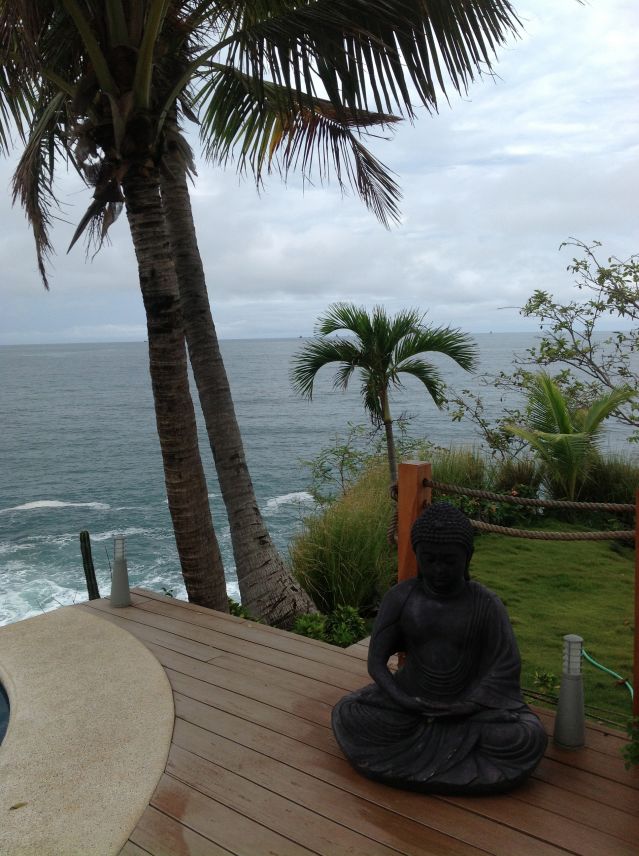Meditation
Savoring the Present Moment
A meditation on impermanence and privilege
Posted February 6, 2014
“When you chew, know what you are chewing. Chew slowly and completely. Chew consciously, savoring the taste of the apple and its nourishment, immersing yourself in the process one hundred percent. This way, you really appreciate the apple as it is. And as you become fully aware of eating the apple, you also become fully aware of the present moment. You become fully engaged in the here and now. Living in the moment, you can really experience what the apple offers you, and you become more alive.” Thich Nhat Hanh and Lilian Cheung Savor (2010)
Thich Nhat Hanh enjoins us to eat one apple slowly and in complete awareness, as a practice of mindfulness.
However, I notice that in my practice, I am aware of the impermanence of the apple. I wonder that if the apple is going to rot, it is impermanent, and therefore the moment that the apple is ripe is brief and fleeting, perhaps I should just toss it into the compost pile right away. Why should I enjoy a sweet ripe apple, or watch it ripen? Why should we disfavor the apple before it is ripe, or when it is overripe and dripping with juice or covered with flies? How can we savor the apple, when it is impermanent, and so are we? Is there not a case to be made that it would be better to hasten the apple on its route to becoming compost or an apple tree, rather than to enjoy its present moment of perfect flavor and sweetness? Is taking care of the apple so that it becomes ripe and pleasing not a form of craving and sensual involvement?
This could be an argument for suicide, especially suicide right at a peak moment of life, when life is exquisite and can only get worse. Why not jump off a bridge into a rainbow or sunset, at a moment of health and joy, rather than to wait for the inevitable suffering of old age and death and decay? Why not emulate Virginia Woolf, and walk right into the ocean with a pocket full of stones at sunset or moonset, when the sea is perfect and the stars are bright?
A literary example of this sentiment occurs in Goethe’s Faust. Most people are aware of Marlowe’s Faust (if they think of Faust at all), and the creation of a “Faustian bargain.” In Marlowe’s version, Dr. Faust agrees to sell his soul to the Devil, Mephistopheles, in exchange for unlimited knowledge and worldly pleasures for 24 years. However, in Goethe’s Faust, the doctor agrees to surrender his soul to the Devil exactly at a moment of perfect bliss:
“When, to the Moment then, I say ‘Ah, stay a while! You are so lovely!’
Then you can grasp me: then you may,
Then, to my ruin, I’ll go gladly!"
I have been struggling with this because at times, in the mornings in Costa Rica, I am overcome by the beauty of the present moment. I see the bats rushing home to find roosts before the dawn. I hear the parrots and parrotlets, doves and woodpeckers carrying on, like commuters in a busy city. Life bursts out of the darkness. I am in awe. It is close to perfect bliss. Yet I know that I cannot stay in Costa Rica forever. I know that it is a hard place to live, and I am getting older each moment. My house is full of stairs. When my parents and in-laws died, in their late 80s, they could barely navigate a flat floor with a wheelchair. How can I live here now, knowing that in the very best case, within 15 years, it will be impossible?
Yet, if I were to leave now, because I know that in 15 years this house will be unmanageable, it would be like throwing a ripe and delicious apple onto the compost heap, just because it is impermanent. This makes no sense at all!

Meditation on Savoring the Present Moment
The Buddha instructs us to savor life even as we know it is impermanent and suffering is inevitable. Siddhartha Gautama gave up asceticism — trying not to enjoy food or sleep — after he achieved enlightenment. In Old Path, White Clouds Thich Nhat Hanh tells the story of how Sujata, a village girl, saved Siddhartha’s life:
"As Sujata neared the river, she saw a man lying unconscious on the road. She put down her platter and ran to him. He was barely breathing and his eyes were tightly closed. His cheeks had the sunken look of someone who had not had food for a long time. From his long hair, tangled beard, and ragged garment, Sujata knew he was a mountain ascetic who must have fainted from hunger. Without hesitating, she poured a cup of milk and eased it against the man’s lips, spilling a few drops on them. At first he did not respond, but then his lips quivered and parted slightly. Sujata slowly poured milk into his mouth. He began to drink and before long the cup was empty.
Sujata then sat along the riverbank to see if the man would regain consciousness. Slowly he sat up and opened his eyes. Seeing Sujata, he smiled. He pulled the end of his garment back up over his shoulder and folded his legs in a lotus position. He began to breathe, first shallowly and then more deeply. His sitting was stable and beautiful. Thinking that he must be a mountain god, Sujata joined her palms and began to prostrate herself before him, but the man motioned for her to stop. Sujata sat up, and the man spoke to her in a soft voice, 'Child, please pour me a little more milk.'
Happy to hear him speak, Sujata poured another cup and he drank it all. He felt how truly nourishing it was. Less than an hour before, he thought he was about to breathe his last. Now his eyes shone and he smiled gently. Sujata asked him how he had fainted on the road.
“I have been practicing meditation in the mountains. Harsh ascetic discipline has left my body weak, so today I decided to walk down to the village to beg for some food. But I lost all my strength getting here. Thanks to you, my life has been saved.” …Sujata listened carefully as Siddhartha told her, “I have seen that abusing the body cannot help one to find peace or understanding. The body is not just an instrument. It is the temple of the spirit, the raft by which we cross to the other shore. I will no longer practice self-mortification. I will go into the village each morning to beg for food.”
Now, there are many huge differences between the Buddha and me. Enjoying the beauty of the morning near the sea in Costa Rica is hardly like begging for a bit of food or accepting a cup of milk. I am enjoying privilege. Moments of living that are not available to everyone. There is a big difference between accepting the gift of a bowl of milk, to save one’s life, and accepting the rewards of work, investment, and inheritance that result in the privilege of an ocean view.
Let us say, for example, that someone gives us a ripe apple, and it tastes very good. That is right livelihood, and being in the present moment. If someone gave me some money long ago, and I used it to buy this house, so that now I can sit and meditate and enjoy the view and the breathing sounds of the sea — that is different. There are two different arguments to contend with. The first argument is about craving, and the abolition of suffering. We should enjoy the present moment. If at one moment we have a ripe apple, and it is very good, we should savor it, not throw it directly into the compost because it will rot eventually. We should not, therefore, make a Faustian bargain, to give our souls to the Devil for a perfect apple. However, in conflict with this argument is right livelihood. If I can buy a ripe apple and you cannot, how can I savor this apple?
I am pretty clear on the first argument — that being happy in the present moment is not only ok, but also a Good Thing. There is no need to end a blissful moment because it will end naturally. However, I am less clear on the second. Is this liberal guilt? Is it fair to savor a perfect moment, while others suffer? So savoring is ok, but fairness remains ambiguous. For now, I am not ready to be a nun. So I will enjoy the dawn in all its glory, fully awake, aware, and appreciative.




